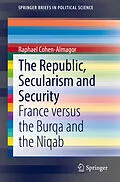This book analyses French cultural policies in the face of what the French government perceives as a challenge to its Republican secular raison d'être. It makes general arguments about France's changing identity and specific arguments about the burqa and niqab ban. The book further explains how French history shaped the ideology of secularism and of public civil religion, and how colonial legacy, immigration, fear of terrorism, and security needs have led France to adopt the trinity of indivisibilité, sécurité, laïcité while paying homage to the traditional trinity of liberté, égalité, fraternité.
Autorentext
Raphael Cohen-Almagor is a Professor of Politics and International Studies and Founding Director of the Middle East Study Group, University of Hull (UK). He completed his DPhil in Political Theory at St. Catherine's College, University of Oxford (UK). Cohen-Almagir taught, inter alia, at Oxford (UK), Jerusalem, Haifa (Israel), UCLA, Johns Hopkins (USA), and Nirma University (India). He also was a Senior Fellow at the Woodrow Wilson International Center for Scholars, Washington DC (USA), and Distinguished Visiting Professor, Faculty of Laws, University College London (UK). In 2021-2022, he is Public Policy Fellow at the Woodrow Wilson International Center for Scholars, and in 2023 will inhabit the Olof Palmes's Guest Professorship, Lund University (Sweden). Cohen-Almagor is the founder of Israel's Second Generation to the Holocaust and Heroism Remembrance Organization, The University of Haifa Center for Democratic Studies, The Van Leer Jerusalem Institute Medical Ethics Think-tank, and The University of Hull Middle East Study Group/Centre. He has published extensively in the fields of politics, philosophy, media ethics, medical ethics, law, sociology, and history.
Inhalt
Introduction.- The Underpinning Values of the French Republic.- The Shaping of the Republic: The Influence of Colonialism, Immigration, and Terrorism.- Banning the Burga and the Niqab.- Conclusion.
